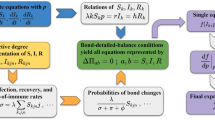Abstract
Most existing spreading models for network viruses are developed refereing to the epidemic models for biological viruses. However, Why most network viruses spread much slower than those models predicate? Why most network viruses still exist when they go beyond the threshold predicated by those models? Contrary to the prior models, the paper points out network viruses have different spreading features compared with biological viruses, such as the connectivity rate and cure rate are both functions of the time which are also key factors to affect the spreading of viruses. Based on which the paper constructs a more general epidemiological model for the network viruses. For several particular cases the paper presents the simulations of the connectivity rate and cure rate and find they are consistent well with the statistics of some real viruses. Thus the paper opens one path to modifying the traditional epidemic models.
Supported by National Natural Science Foundation of China(NO. 60403027) and also supported by Graduate Students Foundation(NO:X0333).
Access this chapter
Tax calculation will be finalised at checkout
Purchases are for personal use only
Preview
Unable to display preview. Download preview PDF.
Similar content being viewed by others
References
Kephart, J.O., White, S.R.: Directed-graph Epidemiological Models of Computer Viruses. In: Proceedings of the 1991 IEEE Computer Society Symposium on Research in Security and Privacy, pp. 343–359. IEEE, Oakland (1991)
Kephart, J.O., White, S.R.: Measuring and Modeling Computer Virus Prevalence. In: Proceedings of the 1993 IEEE Computer Society Symposium on Research in Security and Privacy, pp. 2–15. IEEE, Oakland (1993)
Pastor-Satorras, R., Vespignani, A.: Epidemic Dynamics and Endemic States in Complex Networks. Physical Review E 63, 066117 (2001)
Pastor-Satorras, R., Vespignani, A.: Epidemics and Immunization in Scale-free Networks. In: Bornholdt, S., Schuster, H.G. (eds.) Handbook of Graphs and Networks: From the Genome to the Internet. Wiley-VCH, Berlin (2002)
Wang, C.J., Knight, C., Elder, M.C.: On Computer Viral Infection and the Effect of Immunization. In: Proceedings of the 16th ACM Annual Computer Security Applications Conference, pp. 246–257. IEEE, Washington (2000)
Kumar, S.R., Raghavan, P., Rajagopalan, S., Tomkins, A.: Trawling the Web for Emerging Cyber-communities. Computer Networks, Vol 31, 1481–1493 (1999)
Boguñá, M., Pastor-Satorras, R.: Epidemic Spreading in Correlated Complex Networks. Physical Review E 66, 047104 (2002)
Newman, M.E.J., Forrest, S., Balthrop, J.: Email Networks and the Spread of Computer Viruses. Physical Review E 66, 035101(R) (2002)
Cliff, C.Z., Towsley, D., Gong, W.B.: Email Worm Modeling and Defense. In: Proceeding of ICCCN 2004. IEEE, Chicago (2004)
Bailey, N. (ed.): The Mathematical Theory of Infectious Diseases and Its Applications. Griffin, London (1975)
White, S.R.: Open Problems in Computer Virus Research. In: Virus Bulletin Conference, Munich, Germany (1998)
Chess, D.M.: The Future of Viruses on the Internet. In: Virus Bulletin International Conference, San Francisco, California (1997)
José, R.C.P., Betyna, F.N., Luiz, H.A.M.: Epidemiological Models Applied to Virues in Computer Networks. Journal of Computer Science 1(1), 31–34 (2005)
Jongyun, K., Scidhar, R., Sudarshan, K.D.: Measurement and Analysis of Worm Propagation on Internet Network Topology. In: Proceeding of ICCCN 2004. IEEE, Chicago (2004)
Author information
Authors and Affiliations
Editor information
Editors and Affiliations
Rights and permissions
Copyright information
© 2005 Springer-Verlag Berlin Heidelberg
About this paper
Cite this paper
Han, L., Liu, H., Asiedu, B.K. (2005). Analytic Model for Network Viruses. In: Wang, L., Chen, K., Ong, Y.S. (eds) Advances in Natural Computation. ICNC 2005. Lecture Notes in Computer Science, vol 3612. Springer, Berlin, Heidelberg. https://doi.org/10.1007/11539902_111
Download citation
DOI: https://doi.org/10.1007/11539902_111
Publisher Name: Springer, Berlin, Heidelberg
Print ISBN: 978-3-540-28320-1
Online ISBN: 978-3-540-31863-7
eBook Packages: Computer ScienceComputer Science (R0)





